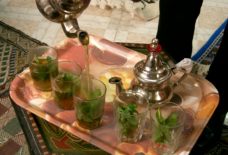Welcome to the Palestine Aquarium, the First of its Kind
SOURCE: ALJAZEERA
BY: SHATHA HAMMAD
Ramallah, Occupied West Bank – Palestinians in the occupied West Bank can now get up close and personal with aquatic animals.
Palestine Aquarium in Ramallah, which is the first of its kind, opened on July 22.
Inside, quiet music plays in the background. Narrow corridors are dimly lit, with transparent tanks on either side filled with colourful fish.
For Palestinians, the 820-metre aquarium provides a unique experience.
It is located in hilly terrain; Israeli authorities forbid Palestinians in the West Bank to access the country’s coastline, including the Gaza Strip.
About 300 people per day have been visiting since the opening. The cost of a ticket is 30 shekels ($8).
On Thursday, a group of children visited. They were on a summer camp programme with the Yasmeen Kindergarten summer camp in Ramallah.
“The children were amazed at what they saw,” Nisreen Kababha, one of the teachers, told Al Jazeera. “They were very happy to learn about aquatic life and to see fish and creatures that they had only seen before in cartoon shows.
“Even as teachers, we were pleasantly surprised by what we saw.”
The ticket price, however, should be lower to encourage more visitors, said Kababha.
As they left, some of the children were already imitating the crocodiles and fish they had seen, as they excitedly made up tales about turtles and the royal blue tang – the species popularised in the animated film, Finding Nemo.
The idea for the attraction came to Amjad Omar, a founder, more than a year ago. He had travelled extensively and seen that most cities had at least one aquarium.
He pitched the idea to a group of Palestinian investors, who worked on the project for 16 months. It has so far cost $1.2m.
Our losses exceeded $47,000 dollars due to delays in the arrival and detention of the aquatic animals. We will face all the obstacles and we will continue to develop the place and bring more aquatic life.
SUFIAN AL-QAWASMI, PALESTINE AQUARIUM COFOUNDER
Sufian al-Qawasmi, from Hebron, is a project engineer and one of Omar’s partners.
He told Al Jazeera that the fish, marine animals, tropical plants and a group of amphibians were brought in from various countries by a Palestinian company via an Israeli importer.
According to the Palestinian news agency, Wafa, 90 percent of the various fish and plants have entered Palestine for the first time.
Coral, Red Sea fish and Nile crocodiles are currently on display, among 250 underwater species.
There are about 3,700 aquatic animals in total, with plans to bring jellyfish, seahorses and sharks in the future.
Qawasmi said Israeli authorities delayed the import of the display tanks. Bringing in the aquatic animals and delivering them to Ramallah was also challenging and expensive.
‘We will face obstacles’
At one point, Qawasmi said, Israeli authorities tried to block parts of the project as they claimed that importing some species was illegal.
Many animals died in containers at the border, where they were prevented from entering Ramallah, and the founding team suffered significant financial losses, he said.
“Many of the aquatic species could not be brought because of this new Israeli decision, which surprised us, since these species were brought to Israel a while ago and there was no objection by the authorities back then,” Qawasmi said, promising to fight back through legal channels.
“We reserve our right to bring water and aquatic organisms as other aquariums do, especially because our aquarium has been recognised internationally. We have the necessary local licenses.”
He explained that the aquarium does not contain endangered species, and said there was no excuse for Israel’s actions.
“Our losses exceeded $47,000 dollars due to delays in the arrival and detention of the aquatic animals,” Qawasmi said. “We will face all the obstacles and we will continue to develop the place and bring more aquatic life.”
The marine life that did make it to the aquarium require special care around the clock.
Hiring brought further challenges as few Palestinians have the right skills for the job. The aquarium now has 22 employees and supervisors are available 24 hours a day.
They change, clean and monitor the temperature of the water, and continuously inspect the animals.
Juliana Daebes, a 24-year-old supervisor, has a degree in biology. It is the first time she is using the skills she learned in her education for work.
“The aquarium caught my attention,” she said. “It is beautiful and new and directly relates to my specialisation in biology, which I studied but could [not] get practical [experience] in.
“But now we have this opportunity to get to know these fish and amphibians up close.”
She is hopeful that the aquarium will continue to welcome visitors and provide careers to Palestinians who have an educational background and interest in marine biology.
“The project will develop continuously and we will be bringing more species of aquatic life that will enrich the aquarium and make it more diverse,” she said. “Every employee has a duty to develop themselves and learn everything that is new.
“People are eager to see and visit the aquarium, especially since Palestinians are prevented from going to the sea and visiting water museums.”
| A Palestinian child looks at aquatic creatures displayed at the aquarium [Abbas Momani/AFP] |


